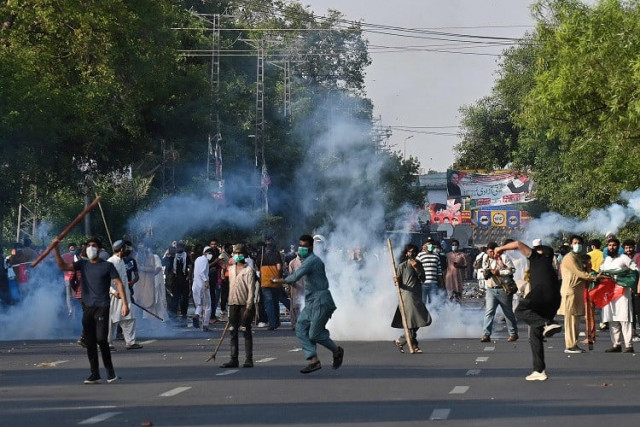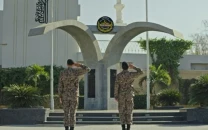May 9 riots: HCs may quash Army Act trials
Lawyer suggests proceeding against them in anti-terrorism courts

Although the National Security Committee (NSC) has given nod to the decision of the corps commanders to try the miscreants -- who caused mayhem on May 9 in violence triggered in the wake of PTI Chairman Imran Khan’s arrest – under the Pakistan Army Act and Official Secret Act on account of attacking military installations, the superior courts might not endorse the trials.
If the trials are initiated, any high court might quash them. Sources told The Express Tribune that the government’s legal team was also divided over whether or not these miscreants could be tried under the Army Act.
One section of team within the government has already conveyed their concerns to Prime Minister Shehbaz Sharif. However, the ruling party has so far not taken this input into consideration.
One of the top legal minds in the PPP also said in principle, no civilian should be tried in a military court during a democratic government. The PPP lawyer said anti-terrorism courts (ATCs) were the best legal way to proceed against these miscreants.
Another lawyer was of the opinion that only a civilian belonging to a terrorist origination could be tried under the Army Act. He expressed apprehensions that civilian trials under the Army Act might invite international rights organisations’ criticism of the Pakistani military.
He suggested that the army should disassociate from these trials and they should be proceeded under the ATCs. It is expected that if the trials initiates under the Army Act, they might be challenged in the high courts.
The chief justices of the high courts will be crucial in connection with the composition of benches to hear these cases. The sources further told The Express Tribune that Imran’s aggressive speeches against senior military officers have pushed on the defensive one section within the judiciary, which was giving relief to the PTI.
Senior lawyers also said it was not easy for the judges to grant relief to the PTI leaders in the prevailing situation. Chief Justice of Pakistan Umar Ata Bandial has already quoted a phrase that “when there is a war, the law remains silent”. However, it has been learnt that the internal situation within the SC is improving with each passing day.
The lawyers are warning the government that if it will take any action contrary to the law and Constitution, it will face resistance as was witnessed at the Islamabad High Court, wherein the PTI chief was given ‘extraordinary relief’ on a single day.
“Military justice is to justice what military music is to music,” said Advocate Mirza Moiz Baig. “The trial of civilians by military courts is generally an aberration given that the mystery which shrouds military courts are inconsistent with the right to fair trial and due process,” he added.
The lawyer continued that unsurprisingly, military courts were only considered valid for trials of members of the armed forces and enemy combatants. He recalled that the Supreme Court had also held the trials of civilians by military courts unconstitutional in the 1990s.
“This is partly why parliament amended the Constitution in 2015 to give validity to the trial of civilians involved in terrorism in the name of religion in the aftermath of the APC [Army Public School in Peshawar] attack. Nonetheless, with the 21st and 23rd Amendments no longer in field and given that attacks on sensitive installations and offences relating to the armed forces are already covered under the Pakistan Penal Code [PPC], the trial of these cases by military courts might raise concerns regarding the separation of powers and independence of the judiciary,” he noted.
Another senior lawyer, Advocate Inaam ur Reheim said 25 civilians were tried by military courts during the tenure of Imran’s premiership. He added that three of them were awarded the death penalty, which was challenged in the Lahore High Court's Rawalpindi Bench. He continued that their execution was held in abeyance ever since.
Advocate Shah Khawar believed that these miscreants could be tried under the Army Act.



















COMMENTS
Comments are moderated and generally will be posted if they are on-topic and not abusive.
For more information, please see our Comments FAQ